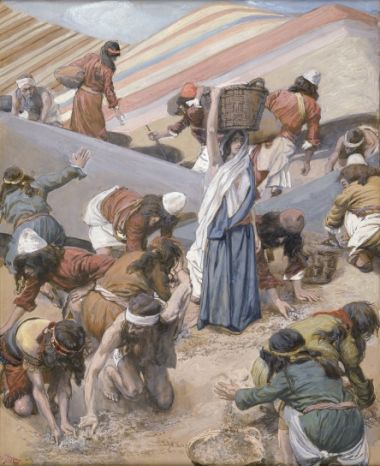3 Lessons For Today From The Manna In The Wilderness

Manna was the gift of God to the people of Israel as they wandered in the wilderness before their entry into the Promised Land. The story of its provision is told in Exodus 16. God says to Moses, "I will rain down bread from heaven for you" (verse 4). The "bread" turns out to be "thin flakes like frost on the ground" (verse 14). It is "white like coriander seed and tasted like wafers made with honey" (verse 31).
The people were to go out eat day and collect enough for that day. On the sixth day they were to collect twice as much, so they wouldn't have to work on the Sabbath – but they were not to collect more than they needed. Those who thought they could store it to the next day found it went rotten.
Is there any way of identifying manna with substances that are known today? There have been various suggestions. One is that manna is the resin from the tamarisk tree, once extensive through the southern Sinai. It is similar to wax, melts in the sun and smells sweet. Another is that it is honeydew secreted by insects, which dries quickly to form a sweet, stick substance. Still another is that is a kind of fungus like Psilocybe cubensis, which can produce spiritual experiences.
We are unlikely ever to know, but as well as the historical context of manna there is something of more enduring significance: its spiritual meaning.
God tells the Israelites they are to gather enough for one day at a time. There are three things we can read from this.
1. It showed a continued dependence on God. The Israelites at this time were a travelling people, reliant on finding grazing and supplies where they could. They were unable to store up large reserves of food. Life was precarious and they may only have been a few days away from starvation at any time. So when God gives them food that can't be stored up for a rainy day, he is encouraging them to depend on him daily. After 40 years of wandering they would enter the Promsed Land and become settled, able to store grain in barns. But their experiences in the wilderness would be a lasting spiritual lesson.
2. It was a way of warning them not to hold on to good things too long. Many of us face this temptation: we like things as they are, and we are resistant to change. But hold on to things instead of letting them go, and they can turn very sour. Sometimes it's right to move on at work or in a church ministry. The fact that we've always done something this way doesn't mean we always should. As the Pilgrim Father John Robinson said in his sermon bidding farewell at the start of the Mayflower voyage, "the Lord has more truth and light yet to break forth out of his holy word".
3. It was a foreshadowing of the true "bread of heaven". Jesus referred to manna in his address to his disciples in John 6. The true bread of God, he said, is "he who comes down from heaven and gives life to the world" (verse 33) – that is, himself. He tells them their ancestors ate the manna and died: "But here is the bread that comes down from heaven, which a man may eat and not die" (verse 50).
There is a great contrast between the manna the Israelites ate in the desert and the true bread of heaven, Jesus. One satisfied for a day, the other satisfies eternally. While one gift has to be perpetually renewed, the other is given once and for all. When we take the bread of communion, we are recalling the once-and-for-all gift of Jesus; and "he who feeds on this bread will live forever" (verse 58).
Follow Mark Woods on Twitter: @RevMarkWoods











